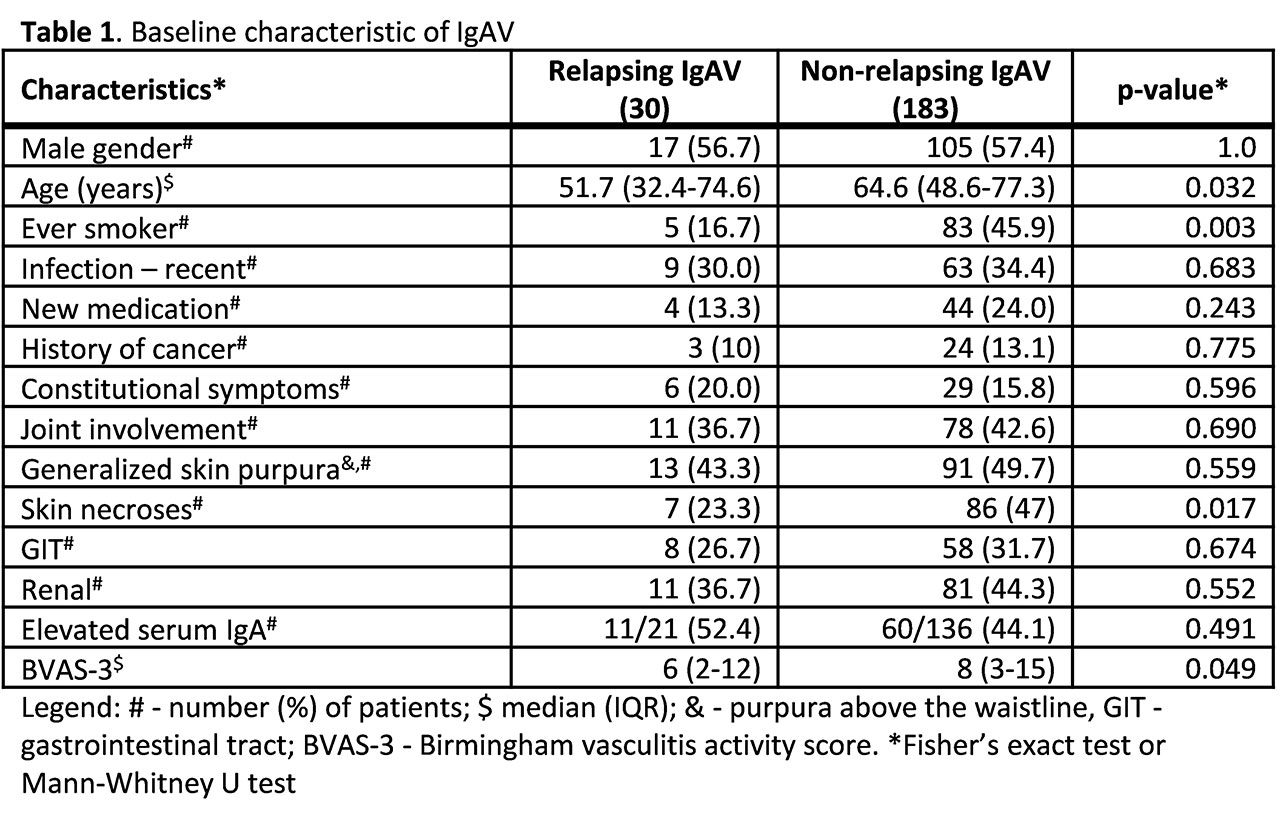Session Information
Session Type: Poster Session (Monday)
Session Time: 9:00AM-11:00AM
Background/Purpose: In adults, IgA vasculitis (IgAV) frequently takes a severe course in the acute phase of the disease. Data on long term outcomes is limited. It has been observed that a proportion of patients relapse. Our aim was to define potential predictors of relapsing IgAV in a cohort of unselected adult IgAV cases.
Methods: We analysed medical records of histologically proven IgAV cases diagnosed between January 2010 and September 2018, and prospectively followed until May 2019. The relapse was defined as a new development of skin purpura, joint or gastrointestinal tract (GIT) symptoms or laboratory signs of renal disease at follow-up visit after clinical/laboratory remission, after exclusion of other causes. We explored the differences in the baseline characteristics between the relapsing and non-relapsing IgAV cases. A multivariate logistic regression model included predictors that significantly differed between the groups.
Results: During the 105-month observation period we identified 250 new IgAV cases. During the acute disease 4 patients died. 33 patients were lost to follow-up. Of the remaining 213 patients who were followed for a median 12.5 (IQR 6.8–24.2) months, 30 (14.1%) patients relapsed. 21 (70%), 5 (16.7%), and 4 (13.3%) patients relapsed once, twice, and three or more times, respectively. The relapse was limited to the skin in 24 (80%) patients, involved skin, joints, GIT and kidneys in 4 (13.3%), and was limited to the kidneys in 2 (6.7%) patients. The comparison of baseline characteristics between relapsing and non-relapsing IgAV subgroup is shown in Table 1. In a multivariate logistic regression model, the relapsing IgAV was associated with younger patient age (OR 0.98 (95% CI 0.96-0.99; p=0.024) and non-smoking status (OR 4.41 (95%CI 1.6-12.1), p=0.004).
Conclusion: Younger IgAV patients, who never smoked, tend to have a higher risk for early relapse and should be followed closely.
To cite this abstract in AMA style:
Ostrovrsnik J, Rotar Z, Tomsic M, Hocevar A. Can We Predict Early Relapses in Adult IgA Vasculitis? [abstract]. Arthritis Rheumatol. 2019; 71 (suppl 10). https://acrabstracts.org/abstract/can-we-predict-early-relapses-in-adult-iga-vasculitis/. Accessed .« Back to 2019 ACR/ARP Annual Meeting
ACR Meeting Abstracts - https://acrabstracts.org/abstract/can-we-predict-early-relapses-in-adult-iga-vasculitis/

